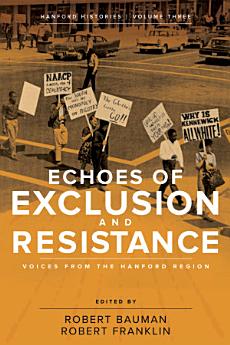Echoes of Exclusion and Resistance: Voices from the Hanford Region
About this ebook
In Echoes of Exclusion and Resistance, the third Hanford Histories volume, four scholars--Laura Arata, Robert Bauman, Robert Franklin, and Thomas E. Marceau--draw from Hanford History Project, Atomic Heritage Foundation, and Afro-American Community Cultural and Educational Society oral histories to focus on the experiences of non-white groups whose lives were deeply impacted by the Hanford Site. Linked in ways they likely could not know, each group resisted the segregation and discrimination they encountered, and in the process, challenged the region’s dominant racial norms.
The Wanapum, evicted by Hanford Nuclear Reservation construction, relate stories of their people, as well as their responses to dislocation and forced evacuation. Unable to interact with the ancient landscapes and utilize the natural resources of their traditional lands, they suffered painful, irretrievable losses. Early arrivals to the town of Pasco, the Yamauchi family built the American dream--including successful businesses and highly educated children--only to have their aspirations crushed by World War II Japanese-American internment. Thousands of African Americans migrated to the area for wartime jobs and discovered rampant segregation. Through negotiations, demonstrations, and protests, they fought the region’s ingrained racial disparity. During the early years of the Cold War, Black women, mostly from East Texas, also relocated to work at Hanford. They offer a unique perspective on employment, discrimination, family, and faith.
About the author
Robert Bauman received his PhD from the University of California, Santa Barbara. He is a Professor of History at WSU Tri-Cities. His research interests are in the areas of race and ethnicity in the American West and poverty and public policy.
Robert Franklin is the Hanford History Project Assistant Director and Lecturer in the Washington State University Tri-Cities History Department. He received his MA in Public History from Washington State University, and specializes in U.S. history, historic preservation, and archival science.
Series Editor Michael Mays is a Professor of History at WSU Tri-Cities and the Hanford History Project Director.





